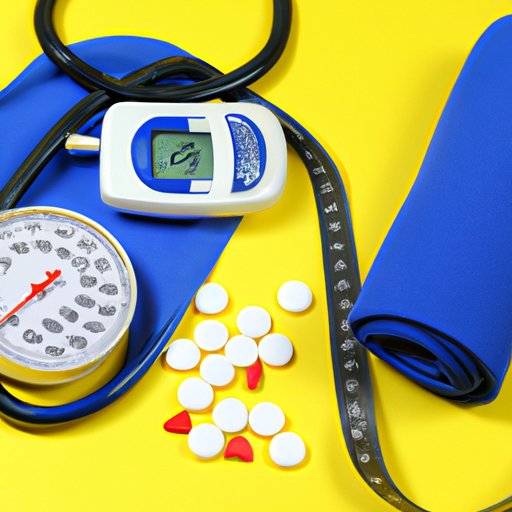
Introduction
High blood pressure or hypertension is a commonly overlooked health problem that can lead to various life-threatening complications such as heart disease, stroke, and kidney failure when left untreated. Therefore, controlling blood pressure is essential for maintaining overall health and wellbeing. This article provides a comprehensive guide on how to get your blood pressure down by discussing various lifestyle changes, such as diet, exercise, stress management, medication, and weight control, that can help to reduce high blood pressure levels.
Diet and Nutrition
One of the most effective ways to manage blood pressure is to maintain a healthy diet. The Dietary Approaches to Stop Hypertension (DASH) diet is an eating plan rich in fruits, vegetables, whole grains, low-fat dairy, and lean proteins, which have been shown to help reduce blood pressure levels. Following the DASH diet can help lower blood pressure by 8-14 mmHg (millimeters of mercury) depending on the severity of the condition. Additionally, reducing the intake of sodium, processed foods, and saturated fats, and increasing potassium-rich foods, such as bananas, avocados, and sweet potatoes, can also help decrease high blood pressure.
Exercise and Physical Activity
Regular physical activity can play a crucial role in controlling blood pressure levels. Exercise can improve the health of your heart and blood vessels by strengthening your heart, lowering your heart rate, and increasing the blood flow in your body. The American Heart Association recommends at least 150 minutes of moderate exercise or 75 minutes of vigorous exercise spread out across the week. Aerobic exercises, such as swimming, cycling, and running, are excellent for lowering blood pressure, but resistance training, such as weight lifting and bodyweight exercises, can also be beneficial. It’s vital to choose an exercise routine that you enjoy and can stick to in the long term.
Weight Management
Being overweight or obese increases the risk of high blood pressure. Losing weight can significantly lower blood pressure levels and reduce the risk of developing related complications. Even a small reduction in weight can help lower blood pressure. To lose weight, it’s essential to maintain a healthy calorie deficit and choose whole foods that are nutrient-rich and low in calories. Additionally, engaging in regular physical activity and avoiding a sedentary lifestyle can also help maintain a healthy weight.
Stress Management and Relaxation Techniques
Stress is a common cause of high blood pressure. Incorporating relaxation techniques into your daily routine can help manage stress levels, which can, in turn, lower blood pressure. Techniques such as deep breathing, meditation, yoga, and tai chi can help reduce stress and anxiety, promote relaxation, and improve overall mental and physical well-being. It’s crucial to find a relaxation technique that works best for you and practice it regularly.
Limit Alcohol Intake
Drinking alcohol in moderation can help lower blood pressure, but excessive alcohol intake can lead to a significant increase in blood pressure levels. The American Heart Association recommends consuming no more than one or two drinks per day for men and women, respectively. Avoid binge drinking and try to limit your intake to a reasonable level to keep your blood pressure under control.
Medications
Several types of medications are available to help manage high blood pressure levels. Diuretics, ACE inhibitors, beta-blockers, and calcium channel blockers are commonly prescribed to lower blood pressure levels. Taking medication as prescribed by your doctor is crucial to achieving the best results. However, it’s essential to note that medication alone is not enough to manage blood pressure levels. Lifestyle changes such as a healthy diet, regular exercise, weight management, and stress management are also crucial.
Conclusion
High blood pressure is a significant health problem that can lead to life-threatening complications. However, managing high blood pressure is possible through lifestyle changes such as a healthy diet, regular exercise, stress management, weight control, and medication. The key takeaway from this article is that implementing lifestyle changes gradually can significantly contribute to lowering blood pressure levels. Readers are encouraged to consult with their doctor before making any significant changes to their lifestyle.




